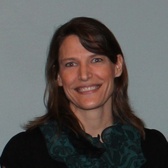

7, 8, 9, 10, 11, 12
Science Teacher
Ms. Paulsen is part of the 2013 class of NITARP educators. She was also part of the inaugural SOFIA Airborne Astronomy Ambassadors.
Many NITARP alumni helped us out with reviewing the NITARP 2019 proposals! Scientists who helped include Tiffany Meshkat, Marja Seidel, Sergio Fajardo-Acosta, Mike Werner, and Julian van Eyken. Thanks to all!
Both NITARP 2014 teams submitted research proposals. Several NITARP alumni helped review them.
Ms. Paulsen got some nice local coverage about her and her team.
Ms. Paulsen got some great local news coverage!
Two of our NITARP/Spitzer alumni -- Cris DeWolf and Peggy Piper -- have been selected to be part of the inaugural SOFIA Airborne Astronomy Ambassadors program! Way to go!!
(Added in 2013 - Theresa Paulsen, new member of the NITARP 2013 class, was also part of this inaugural SOFIA group.)
I feel like a popcorn kernel that has just burst open. I've grown so much at this meeting!
My skills and knowledge as a science teacher have grown exponentially in the last year.
I am exceedingly grateful for the NITARP program. I know that without this experience I would not have been exposed to so many interesting topics and research ideas. I now have a list of things I want to learn that will take me at least 5 years to accomplish. In that time, I know that I have numerous people behind me ready to help as I tackle DS9, python, APT with my students. We will be downloading images and photometry from the NASAs archives for many years. I look forward to sharing what I have learned with other teachers so that they may do the same.
I was much more comfortable approaching people presenting their posters. Last year I felt like I was in way over my head. This year I felt like I fit in just fine, I knew so much more and had the confidence to speak freely about what I didn’t understand. I realized that no one understands all of it, but becoming an expert at one thing gives you the confidence and motivation to learn more.
I discovered that astronomers are just regular people that don’t know everything. They make mistakes just like the rest of us. They are just passionate about what they do and are rewarded for that passion with admiration (but not necessarily money) from the general public. They have cool jobs in awesome places, but most do not get rich from their pursuit of knowledge. Access to data and astronomical images is easy. It is coming up with great questions that makes an astronomer great.
I was least surprised to see how well the students got along with each other. I was fully expecting them to enjoy meeting other students similarly afflicted with a love for science. In small schools it can be difficult for strong minds to stretch their wings without being “clipped” by the rest of the student body. Programs like this allow students to build support networks that encourage them to more vigorously pursue their interests.
I was most surprised at how well my students took to the work. Prior to the trip, they worked to understand the project proposal and researched the instruments, but they seemed a bit detached from it at home. Once here, though, they engaged much more intensely, asked more questions, and really wanted to do a great job. Without prompting they all took out there computers and continued making graphs with our data set at the airport while waiting for our flight home.
The most important thing I learned is that doing astronomical research is easily doable by anyone, anywhere who is inspired to do so. You don’t need to have your own telescope or even to go to an observatory. You can access archival images, photometry, and other data for just about any question you might have regarding not only galaxies, but so much more. Tools are being created and refined by NASA and its outreach programs all the time that allow students and regular citizens to participate in authentic research. The sky is no longer the limit! I will be able to engage my students in our own projects like this. Our only limit will be our ability to come up with questions.
I found it most interesting to see the scientific process in action. Scientists were questioning scientists, sometimes fairly aggressively.
The most interesting thing I learned was that astronomers write and talk to each other in a language all their own, full of jargon and acronyms, but they can orally explain their science easily and do so with enthusiasm on a one-to-one basis. I was hesitant at first to speak to folks at their posters for fear of being judged unfit for discussion, but everyone I talked to was open to conversation and gladly talked about their work at a level I could process. I think many were happy that someone cared enough to stop by their poster.
My robotics students are very wowed by the fact that I met a flight director for the Mars Curiosity Rover.
I’m thinking I’ll have my 6th graders each do a project on an observatory in our astronomy unit. There are so many!
The middle schoolers [from NITARP 2012] fielded questions from an astronomer from the Keck observatory like old pros -‐ very professional! I can’t wait to see my students do the same.